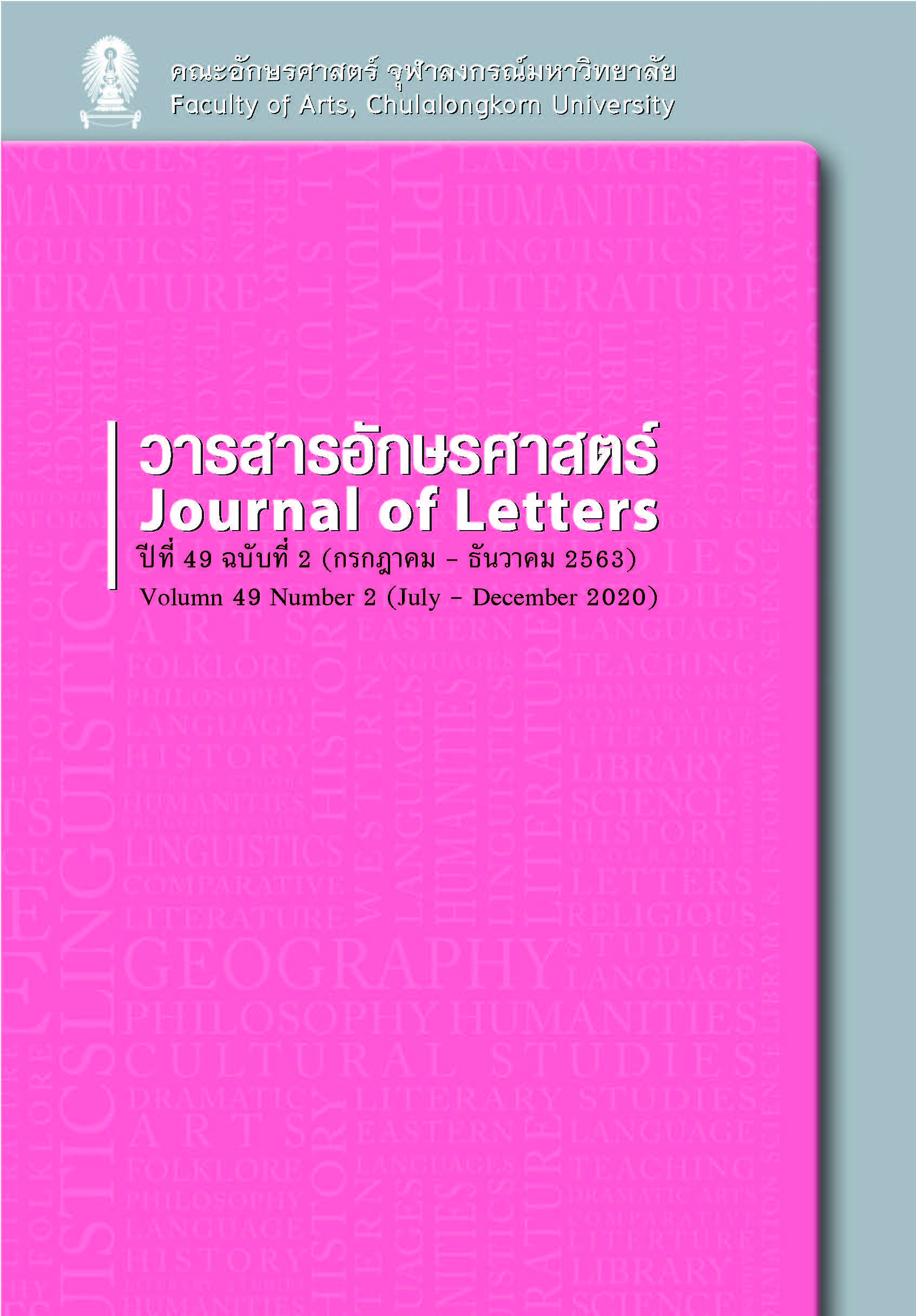Representation of Thailand in Chinese Newspaper Headlines:
The Analysis of Contents and Language Use
Keywords:
Representation, Headlines, Chinese Newspaper, Thailand, Language UseAbstract
This article studies the content, structure, and language used in Chinese newspaper headlines related to Thailand and examines images that represent Thailand in the same headlines, collecting 474 pieces of data from a Chinese daily newspaper, People’s Daily, from a 5-year period from January 1, 2015 to December 31, 2019. The study found that news related to Thailand has been constantly featured in Chinese daily newspapers. The most commonly featured stories are about politics, followed by social and economic news. The unique structures of Chinese newspaper headlines found in political news are as follows; real names and positions of the individuals featured in the news are clearly stated, choices of words in headlines demonstrate friendship and relationships, cooperation and mutual benefits, as well as assistance Thailand receives from China, which implies an unequal relationship between the two countries. The headlines reflect two different images of Thailand; The first represents a positive relationship between Thailand and China, and the second represents the unequal status between the two countries.
References
ภาษาไทย
Kian Teerawit เขียน ธีระวิทย์. 1999. Pathom bot ปฐมบท [Prologue]. In Chin - Thai nai satawat thi 21 จีน - ไทยในศตวรรษที่ 21 [China - Thailand in 21st Century], ed. Vorasakdi Mahatdhanobol, 31-32. Bangkok: Chinese Studies Center, Institute of Asian Studies, Chulalongkorn University.
Krisadawan Hongladarom กฤษดาวรรณ หงศ์ลดารมภ์. 2000. “Paritchet kiaokap chon klum noi nai prathet Thai: Karnsueksa khwam samphan rawang phasa kap udomkarn” ปริจเฉทเกี่ยวกับชนกลุ่มน้อยในประเทศไทย: การศึกษาความสัมพันธ์ระหว่างภาษากับอุดมการณ์ [Discourses on Ethnic Minorities in Thailand: A Study of the Relationship between Form and Meaning]. Research Report, Chulalongkorn University.
Malee Boonsiripunth มาลี บุญศิริพันธ์. 1994. Lakkarn tham nangsuephim bueangton หลักการทำหนังสือพิมพ์เบื้องต้น [Basic Principles of Newspaper Publishing]. Bangkok: Prakaiphruek.
Orrapan Moonchan อรพรรณ มูลจันทร์. 1993. “Karn namsanoe phathuakhao na nueng nai nangsuephim raiwan phasa Thai” การนำเสนอพาดหัวข่าวหน้าหนึ่งในหนังสือพิมพ์รายวันภาษาไทย [The Presentation of Front-page Headlines in Thai Daily Newspapers]. Master thesis, Chulalongkorn University.
Rattana Chantao รัตนา จันทร์เทาว์. 2019. Khao kiaokap prathet Thai nai nangsuephim Wiatnam ข่าวเกี่ยวกับประเทศไทยในหนังสือพิมพ์เวียดนาม [News about Thailand in Vietnamese Newspaper]. Warasarn Phasa Satsana Lae Watthanatham วารสารภาษา ศาสนา และวัฒนธรรม [Journal of Language, Religion and Culture] 8: 52-70.
Royal Thai embassy, Beijing. (n.d.). Khwam samphan Thai – Chin ความสัมพันธ์ไทย-จีน [Thai – China relations]. https://thaiembbeij.org/th/republic-of-china/thai-relations-china/, accessed December 9, 2019.
Sanoh Charoenporn เสนาะ เจริญพร. 2005. Phuying kap sangkhom nai wannakam Thai yuk fong sabu ผู้หญิงกับสังคม ในวรรณกรรมไทยยุคฟองสบู่ [Women and Society in Thai Literature During the Era of Economic Bubble]. Bangkok: Matichon.
ภาษาต่างประเทศ
Dao, G., Sun, Y., & Yin, F. 刀国新,孙永红,印凡2017. Taiguo zhuliu meiti Zhongguo lianghui baodao zhong de zhongguo xingxiang yanjiu: Yi Taiguo dianshi jiu pindao he Taile bao wei li 泰国主流媒体中国两会报道中的中国形象研究——以泰国电视九频道和《泰叻报》为例 [Study of Images of China in News Report on China’s NPC and CPPCC Two Sessions Meeting in Thai Mainstream Media: Case Study of Channel 9 and Thai Rath Newspaper]. Xinwen yanjiu daokan 新闻研究导刊 [Journal of News Research] 13: 8-10.
Dong, Yi 董义. 2002. Xiuci fangshi zai xinwen lei biaoti zhong de yunyong 修辞方式在新闻类标题中的运用 [The Use of Rhetorical Techniques in Headlines]. Xiuci xuexi 修辞学习 [Rhetoric Learning] 4: 38-39.
Fairclough, Norman. 1995. Media Discourse. London: Edward Arnold.
Fowler, Roger. 1991. Language in the News: Discourse and Ideology in the Press. Oxon: Routledge.
Hall, Stuart (Ed.). 1997. Representation: Cultural Representations and Signifying Practice. London: SAGE Publications.
Hu, Jin 胡瑾. 2018. Guochan xiju dianying zhong de Taiguo xingxiang: yi Taijiong, Tangrenjie, Zhe jiu shi ming wei li 国产喜剧电影中的泰国形象——以《泰囧》《唐人街探案》《这就是命》为例 [Images of Thailand in Chinese Comedy Films: Case Study of Lost in Thailand, Detective Chinatown, Kill Me Please]. Wenjiao ziliao 文教资料 [Cultural and Educational Materials] 34: 147-149.
Simpson, Paul. 1993. Language, Ideology and Point of View. Oxon: Routledge.
Tao, Yun 陶云. 2019. Taile bao dui Zhong Mei maoyi moca de baodao fenxi. 《泰叻报》对中美贸易摩擦的报道分析 [Analysis of News Report on China–United States Economic Disputes in Thai Rath Newspaper]. Shiting 视听 [Radio and TV Journal] 6: 196-197.
The state council of the people’s republic of China. 2015. Zhong-tai tielu hezuo xiangmu zhengshi qidong 中泰铁路合作项目正式启动 [China-Thailand Railway Project Kicks off]. http://www.gov.cn/guowuyuan/2015-12/19/content_5025872.htm, accessed December 9, 2019.
Van Dijk, Teun A. 1988. News as Discourse. Hillsdale, New Jersey: Lawrence Erlbaum Associates.
Yao, Ting 姚婷. 2013. Taiguo zhuliu baozhi “Meigonghe shijian” baodao zhong de “Zhongguo xingxiang” 泰国主流报纸“湄公河事件”报道中的“中国形象” [“Images of China” in News Reports on “Mekong Incident” in Thai Mainstream Newspapers]. Guangxi minzu shifan xueyuan xuebao 广西民族师范学院学报 [Journal of Guangxi Normal University for Nationalities] 6: 34-38.
Downloads
Published
How to Cite
Issue
Section
License
Copyright and plagiarism
Authors are responsible for obtaining permission to use copyrighted materials from copyright owners. Authors are responsible for observing requisite copyright law when quoting or reproducing copyrighted materials. Quotations and reproductions of content from other published sources must be accompanied by a reference and all sources should be clearly listed in the references section. Quotations and reproductions of content from external sources without due attribution could be considered a severe infringement of academic conduct and may constitute a legal offence under the Copyright Act of B.E. 2537. Any legal ramifications arising from the infringement of copyright regulations would be the sole responsibility of the author(s).



